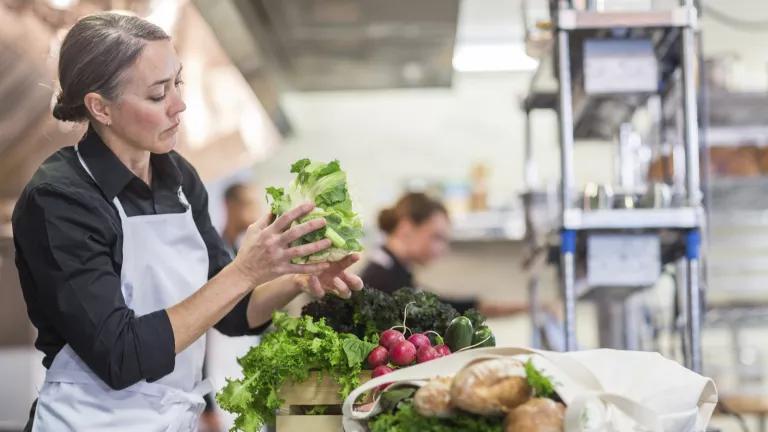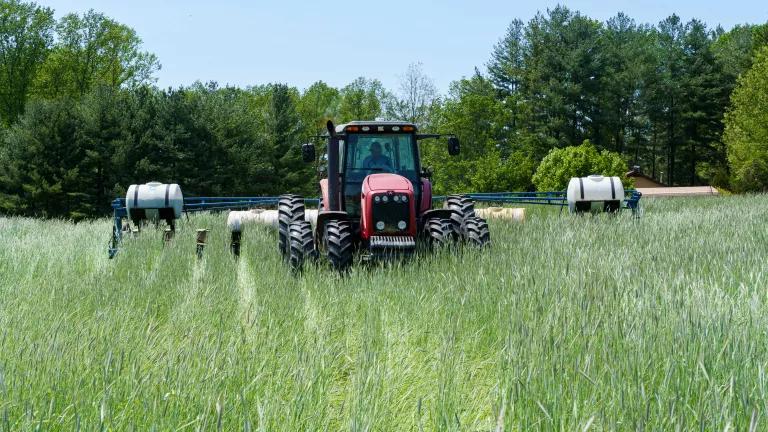New Bill Would Improve Donation of Surplus Food
The Food Donation Improvement Act of 2021 would address the current limitations of the 1996 Bill Emerson Good Samaritan Food Donation Act—and is a critical step towards increasing the amount of surplus food that is donated.

Update as of January 5, 2023: President Biden signed the Food Donation Improvement Act into law. The final text extends liability protections to donations provided at a low price and to certain direct donations to individuals. It does not include the provision that directs USDA to clarify labeling standards.
In 2020, 38.3 million people in the U.S. lived in a food-insecure household, meaning at times during the year, these households were uncertain of having, or unable to acquire, enough food to meet the needs of all their members. In 2021, that number was projected to be 42 million people, slightly more than the entire population of California. As shown in a recently released EPA report, we have more than enough food in the U.S. to feed everyone. By redistributing healthy surplus food, we can help ensure adults and children have enough food on their plates while also working to combat the underlying causes of food insecurity. It is important to note, as detailed in NRDC’s Feeding a City report, food insecurity is not only a factor of low income, but also of high housing and medical costs and other factors. While food donation is not the silver bullet to ending food insecurity, where surplus food is available, it should be used to meet people’s food needs.
Currently, the donation of surplus food is protected by the 1996 Bill Emerson Good Samaritan Food Donation Act (42 U.S. Code § 1791). The Emerson Act is designed to encourage companies to donate their surplus food to nonprofits by providing civil and criminal liability protection for donation of wholesome food to a registered 501c3 nonprofit organization. While these protections are essential to fostering food donations, there are ways in which the Emerson Act could be amended to expand the categories of food that qualify for donation. The Food Donation Improvement Act of 2021 would address the current limitations of the Emerson Act and is a critical step towards increasing the amount of surplus food that is donated.
The Food Donation Improvement Act would amend the Emerson Act in three ways:
- Extend liability protection to donations provided at a low price: Currently, the Emerson Act only protects food donations where the end participant receives food free of charge. Expanding protections to cover nonprofit organizations and others that provide products at a low price (an amount that covers the cost of handling, administering, and distributing the food) would help support different food donation models and allow organizations like nonprofit grocery stores to operate more effectively.
- Extend liability protection for certain direct donations to individuals: The Emerson Act only covers donations to 501c3 registered nonprofits, which creates an unnecessary barrier for businesses, restaurants, schools, and other organizations looking to donate good food directly where it is needed. The pandemic showed that local retailers, restaurant owners, and farmers are heavily relied on to meet emergency food needs, and these groups often have immediate access to community members not always reached by food pantries. Businesses and organizations that handle food are required to have food protection and food handler certifications that adhere to safety standards comparable to food banks and pantries. Protecting direct donations by businesses and food service institutions (or by farmers, who donate low-risk products such as produce) that adhere to these standards can allow individuals to access food more easily.
- Clarify labeling standards that food products must meet to be eligible for liability protection: The Emerson Act does not specifically mention what labeling standards food products must meet to be covered by liability protection, and that can lead to donor confusion. The Emerson Act also does not direct any government agency to help oversee this regulation. The FDIA would direct USDA to help clarify labeling standards, which would help donors get more clarity on existing regulations and know which agency is responsible for overseeing them.
Expanding existing liability protections for food donation is crucial to ensuring that farms, businesses, restaurants, schools, and other organizations can donate a wider breadth of safe, quality foods, including fresh produce, without a concern about potential litigation.
The Food Donation Improvement Act of 2021 has bicameral, bipartisan support. It was introduced by Senators Blumenthal and Toomey in the Senate and Representatives McGovern, Pingree, Newhouse, and Walorski in the House. At the time of writing, the bill is co-sponsored by Representatives Keller, Reschenthaler, Wild, Brown, Hayes, Norton, and Stansbury, as well as Senator Braun. We need your help to get the Food Donation Improvement Act passed into law. If you support expanding liability protections for food donation, reach out to your senators and representatives and ask them to support this bill. You can also sign this petition from the Healthy Living Coalition calling for improvements to the Emerson Act.





